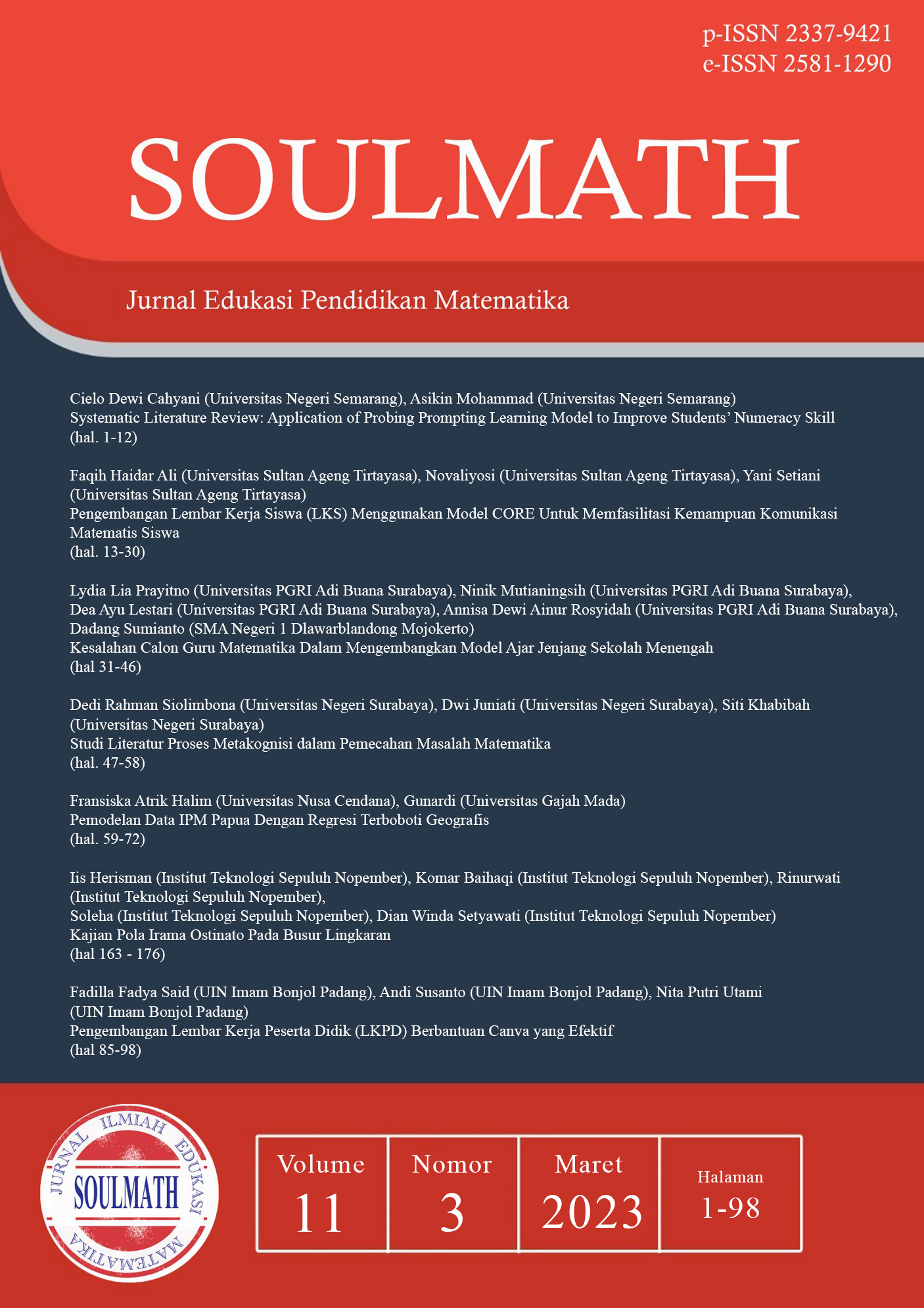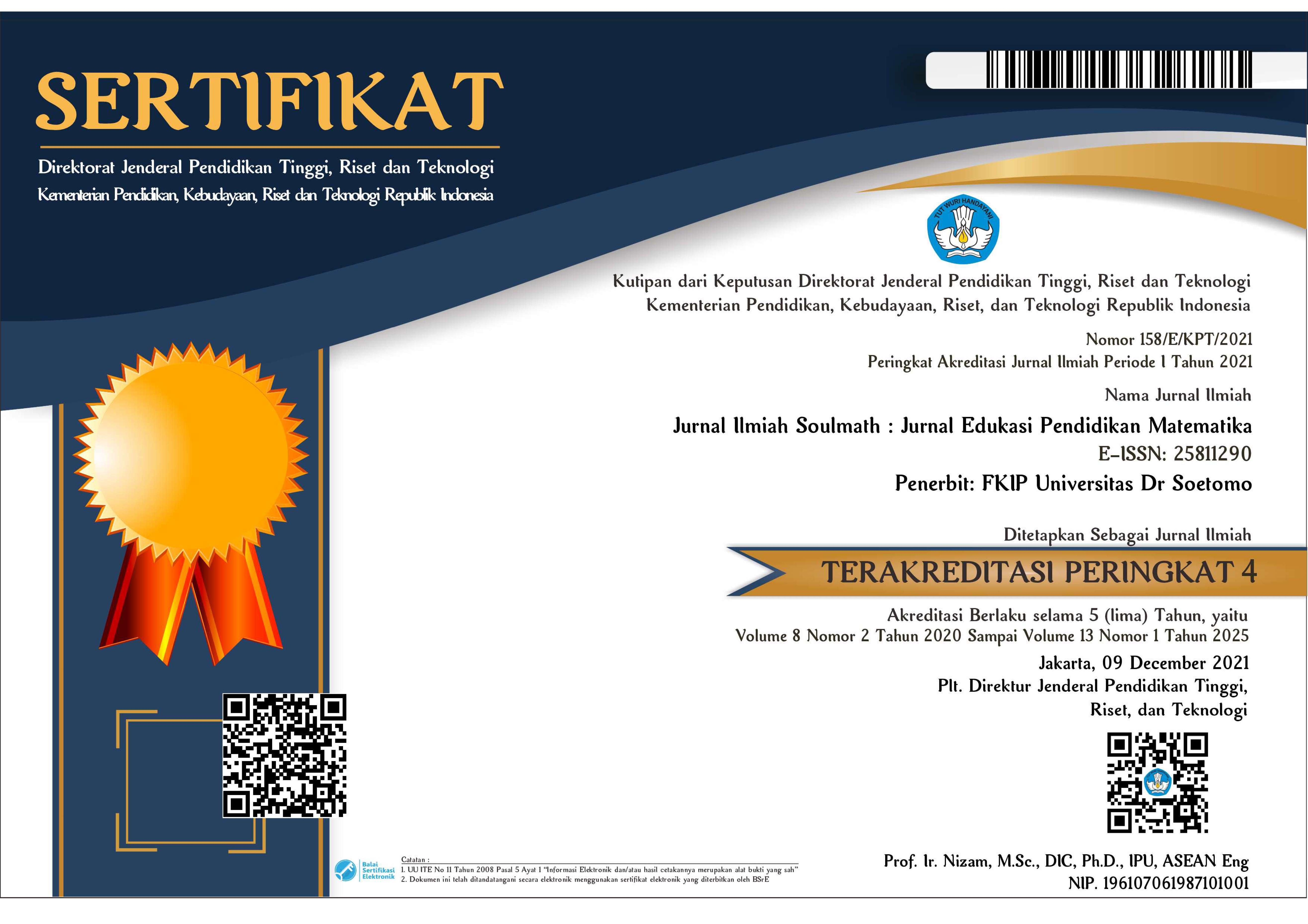Studi Literatur Proses Metakognisi dalam Pemecahan Masalah Matematika
 Abstract views: 650
,
Abstract views: 650
,
 5618 publish (Bahasa Indonesia) downloads: 580
5618 publish (Bahasa Indonesia) downloads: 580
Abstract
Abstract
This article aims to describe mathematical problem-solving and its relation to the process of metacognition. This study focuses on mathematical problem-solving activities which are an important aspect of learning, especially learning mathematics. The analysis and theoretical description of the importance of the process of metacognition in solving mathematical problems are presented with two main thoughts. Namely, exposure to mathematical problem-solving activities that are closely related to one's metacognition processes and how metacognition processes take on their role to improve problem-solving skills in learning mathematics. The method used in this study is a literature study. Data collection is done by examining, reading, and drawing conclusions from various sources. The source used is in the form of articles that have been published at least sinta 4 as many as 20 articles. The conclusion from this article is those mathematical problem-solving activities are activities that require optimizing students' metacognition processes. In this case, mathematical problem-solving activities must enable students to be able to optimize declarative, procedural, and conditional knowledge through planning, monitoring, and evaluating students' cognitive processes.
Keywords: the process of metacognition, learning mathematics, solving mathematical problems
Abstrak
Artikel ini bertujuan untuk mendeskripsikan pemecahan masalah matematika dan keterkaitannya dengan proses metakognisi. Penelitian ini menitikberatkan pada kegiatan pemecahan masalah matematika yang merupakan salah satu aspek penting dalam pembelajaran, khususnya pembelajaran matematika. Analisis dan penggambaran teoretis tentang pentingnya proses metakognisi dalam pemecahan masalah matematika disajikan dengan dua pemikiran utama. Yakni, pemaparan mengenai kegiatan pemecahan masalah matematika yang erat kaitannya dengan proses metakognisi seseorang dan bagaimana proses metakognisi mengambil perannya untuk meningkatkan keterampilan pemecahan masalah dalam pembelajaran matematika. Metode yang digunakan dalam penelitian ini adalah studi literatur. Pengumpulan data dilakukan dengan menelaah, membaca dan menarik kesimpulan dari berbagai sumber. Sumber yang digunakan berupa artikel-artikel yang telah di terbit pada jurnal terakreditasi minimal sinta 4 sebanyak 20 artikel. Kesimpulan dari artikel ini adalah kegiatan pemecahan masalah matematika adalah kegiatan yang memerlukan pengaoptimalisian proses metakognisi peserta didik. Dalam hal ini, kegiatan pemecahan masalah matematika harus memungkinkan peserta didik agar dapat melakukan pengoptimalan terhadap pengetahuan declaratif, prosedural, dan kondisional melalui perencanaan, pemantauan, dan evaluasi proses kognisi peserta didik.
Kata kunci: proses metakognisi, pembelajaran matematika, pemecahan masalah matematika
Downloads
References
F. Barrera-Mora and A. Reyes-RodrÃguez, “Cognitive processes developed by students when solving mathematical problems within technological environments,†Math. Enthus., vol. 10, no. 1–2, pp. 109–136, 2013, doi: 10.54870/1551-3440.1262.
A. Kuzle, “Patterns of metacognitive behavior during mathematics problem-solving in a dynamic geometry environment,†Int. Electron. J. Math. Educ., vol. 8, no. 1, pp. 20–40, 2013, doi: 10.29333/iejme/272.
Lesh, R.A., & Doerr, H.M. (2003). Beyond Constructivism: Models and Modeling Perspectives on Mathematics Problem Solving, Learning, and Teaching (1st ed.). Routledge. https://doi.org/10.4324/9781410607713.
D. Kamikaze, “How To Solve It: A New Aspect of Mathematical Method.†pp. 1–62, 2002.
D. Purnomo, T. Nusantara, S. Rahardjo, D. Pendidikan, M. Pascasarjana, and U. Negeri, “Proses Metakognisi Matematis Siswa Dalam Pemecahan Masalah,†Pros. Semin. Nas. Mat. dan Pendidik. Mat., vol. 5, no. 1, pp. 67–76, 2014.
A. Caballero, L. J. Blanco, and E. Guerrero, “Problem solving and emotional education in initial primary teacher education,†Eurasia J. Math. Sci. Technol. Educ., vol. 7, no. 4, pp. 281–292, 2011, doi: 10.12973/ejmste/75206.
J. F. Mundy, “Principles and standards for school mathematics: A guide for mathematicians,†Not. Am. Math. Soc., vol. 47, no. 8, pp. 868–876, 2000.
NCTM. (2000). Principles and Standards for School Mathematics. United States of America : The National Council of Teachers of Mathematics, Inc.
Programme for International Student Assessment 2015. (2016). Results Excellence and Equity in Education Volume I. PISA, OECD Publishing.
C. E. Hmelo-Silver, “Problem-based learning: What and how do students learn?,†Educ. Psychol. Rev., vol. 16, no. 3, pp. 235–266, 2004, doi: 10.1023/B:EDPR.0000034022.16470.f3.
H. F. Sopia and D. U. Wutsqa, “Keefektifan Pendekatan Realistik Ditinjau dari Prestasi Belajar, Kemampuan Pemecahan Masalah, dan Kepercayaan Diri Matematika,†PYTHAGORAS J. Pendidik. Mat., vol. 10, no. 2, p. 146, 2015, doi: 10.21831/pg.v10i2.9139.
Flavell, J. H. (1979). Metacognition and cognitive monitoring a new area of cognitive–developmental inquiry. American Psychologist, 34(10), 906–911. https://psycnet.apa.org/doi/10.1037/0003- 066X.34.10.906.
J. Wilson and D. Clarke, “Towards the modelling of mathematical metacognition,†Math. Educ. Res. J., vol. 16, no. 2, pp. 25–48, 2004, doi: 10.1007/BF03217394.
J. a Livingston, “Metacognition: an overview,†Psychology, vol. 13, pp. 259–266, 1997, [Online]. Available: http://gse.buffalo.edu/fas/shuell/CEP564/Metacog.htm.
Magiera, M. T., & Zawojewsky, J. S. (2011). Characterizations of social-based and self-based contexts associated with students’ awareness, evaluation, and regulation of their thinking during smallgroup mathematical modeling. Journal for Research in Mathematics Education, 42(5), 23–47.
N. R. Nool, “Exploring the metacognitive processes of prospective mathematics teachers during problem solving,†Int. Conf. Educ. Manag. Innov., vol. 30, pp. 302–306, 2012, [Online]. Available: http://www.ipedr.com/vol30/59-ICEMI 2012-M10059.pdf.
E. Indarini, T. Sadono, and M. E. Onate, “Pengetahuan Metakognitif Untuk Pendidik Dan Peserta Didik,†Satya Widya, vol. 29, no. 1, p. 40, 2013, doi: 10.24246/j.sw.2013.v29.i1.p40-46.
L. B. Barbacena and Norina R.Sy, “Metacognitive Model in Mathematical Problem Solving,†Intersection, vol. 12, no. 1, pp. 16–22, 2015.
M. Tzohar-Rozen and B. Kramarski, “Metacognition, Motivation and Emotions: Contribution of Self-Regulated Learning to Solving Mathematical Problems,†Glob. Educ. Rev., vol. 1, no. 4, pp. 76–95, 2014, [Online]. Available: http://ger.mercy.edu/index.php/ger/article/view/63.
A. O. Akturk and I. Sahin, “Literature review on metacognition and its measurement,†Procedia - Soc. Behav. Sci., vol. 15, pp. 3731–3736, 2011, doi: 10.1016/j.sbspro.2011.04.364.
M. Nahil, “University Student’s Learning Styles and Their Ability to Solve Mathematical Problems,†Int. J. Bus. Soc. Sci., vol. 6, no. 4, pp. 121–134, 2015.
F. Kazemi, M. R. Fadaee, and S. Bayat, “A subtle view to metacognitive aspect of mathematical problems solving,†Procedia - Soc. Behav. Sci., vol. 8, no. 5, pp. 420–426, 2010, doi: 10.1016/j.sbspro.2010.12.058.
Ifenthaler, D. (2012). Determining the effectiveness of prompts for self-regulated learning in problem-solving scenarios. Journal of Educational Technology & Society, 15(1), 38-52.
D. Erdem-Keklik, “The Scale for Problem Solving Skills in Mathematics: Further Evidence for Construct Validity,†Procedia - Soc. Behav. Sci., vol. 84, pp. 155–159, 2013, doi: 10.1016/j.sbspro.2013.06.527.
Novotná, Jarmila, P. Eisenmann, J. Přibyl, J. Ondrušová, and J. Břehovský, “Problem Solving in School Mathematics Based on,†J. Effic. Responsib. Educ. Sci., vol. 7, no. 1, pp. 1–6, 2012, doi: 10.7160/eriesj.2013.070101.Introduction.
B. R. Evans, “Breakthrough moments in problem solving,†Math. Teaching-Research J., vol. 8, no. 1–2, 2016.
Dewey, John (1961). Democracy and Education. United States. Tersedia dalam: wikisource.
Anggo, M. (2011, July). The metacognitive process of teacher college students in solving mathematical problem. In Proceeding International Seminar and the Fourth National Conference on Mathematics Education (pp. 368-376).
A. Yimer and N. F. Ellerton, “Cognitive and metacognitive aspects of mathematical problem solving: An emerging model,†Identities, Cult. Learn. spaces, no. 1994, pp. 575–582, 2006.
Z. Zhu, “Gender differences in mathematical problem solving patterns: A review of literature,†Int. Educ. J., vol. 8, no. 2, pp. 187–203, 2007.







